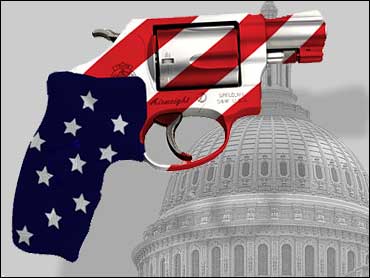ezliving
Besieger
D.C. Appeals Court Upholds Mandatory Gun Licensing
Posted by Declan McCullagh

(CBS/AP)
An appeals court in Washington, D.C. has upheld the city's extremely restrictive law requiring residents to obtain licenses to carry handguns outside of their homes.
The U.S. Supreme Court's ruling last year in the high-profile D.C. v. Heller Second Amendment case did not invalidate the District of Columbia's licensing requirements, and even appears to have endorsed them, the appeals court ruled.
"While the statute indisputably imposes a regulatory restriction on the right to bear arms, on its face it does not stifle a fundamental liberty," the D.C. Court of Appeals concluded in an opinion dated August 27.
The case arose out of a criminal prosecution of a fellow named Manuel Brown, who was charged with crimes including carrying a pistol without a license. On appeal, Brown claimed the ordinance violated his Second Amendment rights. (The relevant law says: "No person shall carry within the District of Columbia either openly or concealed on or about their person, a pistol, without a license issued pursuant to District of Columbia law, or any deadly or dangerous weapon capable of being so concealed.")
Now, bad facts tend to make bad law, and Brown -- who had been convicted of murder by this point -- was hardly a sympathetic defendant. Different facts and a different litigant may have yielded a different result, and Brown would probably not have been able to obtain a concealed weapon license anyway.
Still, it's worth noting that the Second Amendment Foundation filed a federal lawsuit against the District a few weeks earlier on a very similar question: the constitutionality, post-Heller, of the city's licensing scheme.
Alan Gura, the Alexandria, Va. attorney who filed the civil suit, told me on Wednesday evening that he doesn't think the recent appeals court decision will make much of a difference.
"We're not challenging the requirement for a license," Gura said. But, he added, "there has to be the ability for people to quality for a license."
As an aside, the reason I called the District's law extremely restrictive is not the mere requirement for a license; not all states permit unlicensed open carry of firearms, and only Vermont and Alaska allow concealed carry without licenses. The reason the District's law is so restrictive is that a law enacted in December 2008 seems to have limited the ability of the police chief to authorize any carrying of firearms for self defense.
Here's another excerpt from Brown v. U.S., which was decided by the city's equivalent of a state appeals court, while Gura's lawsuit will be heard in federal court:
Posted by Declan McCullagh

(CBS/AP)
An appeals court in Washington, D.C. has upheld the city's extremely restrictive law requiring residents to obtain licenses to carry handguns outside of their homes.
The U.S. Supreme Court's ruling last year in the high-profile D.C. v. Heller Second Amendment case did not invalidate the District of Columbia's licensing requirements, and even appears to have endorsed them, the appeals court ruled.
"While the statute indisputably imposes a regulatory restriction on the right to bear arms, on its face it does not stifle a fundamental liberty," the D.C. Court of Appeals concluded in an opinion dated August 27.
The case arose out of a criminal prosecution of a fellow named Manuel Brown, who was charged with crimes including carrying a pistol without a license. On appeal, Brown claimed the ordinance violated his Second Amendment rights. (The relevant law says: "No person shall carry within the District of Columbia either openly or concealed on or about their person, a pistol, without a license issued pursuant to District of Columbia law, or any deadly or dangerous weapon capable of being so concealed.")
Now, bad facts tend to make bad law, and Brown -- who had been convicted of murder by this point -- was hardly a sympathetic defendant. Different facts and a different litigant may have yielded a different result, and Brown would probably not have been able to obtain a concealed weapon license anyway.
Still, it's worth noting that the Second Amendment Foundation filed a federal lawsuit against the District a few weeks earlier on a very similar question: the constitutionality, post-Heller, of the city's licensing scheme.
Alan Gura, the Alexandria, Va. attorney who filed the civil suit, told me on Wednesday evening that he doesn't think the recent appeals court decision will make much of a difference.
"We're not challenging the requirement for a license," Gura said. But, he added, "there has to be the ability for people to quality for a license."
As an aside, the reason I called the District's law extremely restrictive is not the mere requirement for a license; not all states permit unlicensed open carry of firearms, and only Vermont and Alaska allow concealed carry without licenses. The reason the District's law is so restrictive is that a law enacted in December 2008 seems to have limited the ability of the police chief to authorize any carrying of firearms for self defense.
Here's another excerpt from Brown v. U.S., which was decided by the city's equivalent of a state appeals court, while Gura's lawsuit will be heard in federal court:
On its face, the licensure requirement that the CPWL (carrying a pistol without a license) statute imposes does not appear as a substantial obstacle to the exercise of Second Amendment rights. Moreover, while the statute indisputably imposes a regulatory restriction on the right to bear arms, on its face it does not stifle a fundamental liberty. See United States v. Miller, 604 F.Supp.2d 1162, 1170 (W.D.Tenn.2009) ("a close examination of Heller reveals that the Court never explicitly embraced ... the right to bear arms as 'fundamental' under the Constitution"). For these reasons, we conclude that the CPWL statute is not invalid on its face.
We turn next to amicus's "as applied" argument: the argument that enforcement against appellant of the CPWL statute-as part of the District's regulatory scheme that required him to have a license to carry a pistol but made it impossible for him to obtain such a license-violated his rights under the Second Amendment... Under either approach-intermediate scrutiny or a consideration of whether the restriction is "similar enough ... to justify its inclusion in the list of ‘longstanding prohibitions' that survive Second Amendment scrutiny" -- we have little trouble concluding that the enforcement of the CPWL statute involved here was lawful.
http://www.cbsnews.com/blogs/2009/09/10/taking_liberties/entry5299667.shtml
We turn next to amicus's "as applied" argument: the argument that enforcement against appellant of the CPWL statute-as part of the District's regulatory scheme that required him to have a license to carry a pistol but made it impossible for him to obtain such a license-violated his rights under the Second Amendment... Under either approach-intermediate scrutiny or a consideration of whether the restriction is "similar enough ... to justify its inclusion in the list of ‘longstanding prohibitions' that survive Second Amendment scrutiny" -- we have little trouble concluding that the enforcement of the CPWL statute involved here was lawful.
http://www.cbsnews.com/blogs/2009/09/10/taking_liberties/entry5299667.shtml

